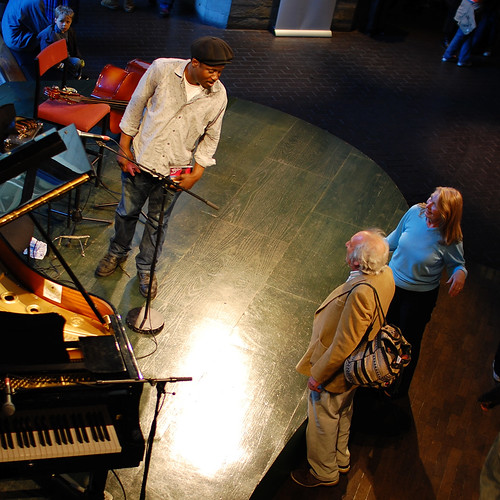Just about a year ago, Daniel Barenboim came to London to play the complete Beethoven sonatas in a heroic two weeks and a half. Tickets to his shows were the hottest items in town, and he managed to sell out Royal Festival Hall during all eight nights. A friend of mine came over from the US last February at least partly motivated by the opportunity to enjoy the concerts. He went to four shows and took me to two. It was absolutely outstanding.
With music of this quality in my mind's ear and on my stereo, I would be bound for severe withdrawal symptoms in any other city, but London never fails to surprise and frequently exceed expectations. This year Jean-Bernard Pommier is repeating Barenboim's feat, but on a less monumental scale. Over the course of a generous eight months, he is playing, like his predecessor, Beethoven's 32 piano sonatas, to the tune of one concert a month.
His chosen venue is King's Place, a brand-new multipurpose cultural center comprising two concert halls, a commercial gallery, a tony restaurant, a café, and plenty of exhibition space. The complex shares an airy atrium with the new Guardian headquarters, and some of the events – talks on current affairs or podium discussions – show that the proximity is no accident. I most like the place for its very affordable tickets. If you book the net specials, you can't pick a seat but pay just under a tenner. You're guaranteed a seat but learn which one only an hour before the show when seats are disbursed by order of booking. As the halls are fairly small and there are no pillars obstructing the view, these surprise tickets are among the best deals in town. I guess the venue is so new that they need to get the word out – and people in.
The other day, I went to hear Monsieur Pommier play four of the sonatas. We arrived just in time for a quick drink from the bar and few chords from the jazz trio placed somewhat incongruously in a corner near the entrance to the restaurant. I was really excited about this concert. Three of the sonatas were new to me played live, but one I had heard a year earlier. Revisiting pieces is something I enjoy a lot because it teaches me a great deal about the music and lets me compare interpreters and venues.
This year and last couldn't have been more different. Kings Place is intimate. Hall One holds about 500 people. We sat in row 8 and heard the piano that was standing right in front of us clearly and crisply. Last year, in the vast Royal Festival Hall with its 3000 seats, I was up on the balcony far from the stage and what I heard was not the instrument itself but the sound of it, bouncing off the walls and the ceiling, immersing the audience in an aura of sonic brilliance. The essence of music was laid bare in a way that is impossible in a smaller space.
There was also a marked contrast between the artists. Pommier quite literally worked the piano. His concentrated face reddened with effort occasionally and his body swayed back and forth with every crescendo and every pause. Barenboim was infinitely more majestic. It was almost as if his hands were playing the piano on their own accord. His body simply provided a way to hold them. The person Barenboim seemed to be in a completely different place altogether. This was exemplified two or three times during quite parts when only the left hand was playing. The right hand was then free to move over to where a towel hung from the side of the piano, grab it and dry the face of the maestro. In no hurry whatsoever, the towel was put back and the hand returned whence it had come, to resume playing when the score called for it. This poise was stunning.
The most striking difference between the two virtuosi came at the end of each sonata. After the last key Pommier would jump up explosively as if released from an ordeal. The sound of the piano was brought to an abrupt end when his foot left the damper pedal. He turned toward the audience from which wild cheers erupted. When Barenboim finished playing a sonata, the last harmony was allowed to linger while he slowly returned from his trance and became a mere mortal again. As he leaned back, the silence that he considers as much part of the music as the sounds preceding it developed until taking over the entire hall. At some point, the tension in Barenboim broke visibly, and the audience erupted in ovations.
I liked Barenboim's performance better. It gave a full-body experience of the music and accorded it the dignity it is due. Pommier felt more rushed, but being a musical tenderfoot, I could be completely wrong. Both are clearly accomplished musicians. Barenboim's record speaks for himself, but with a First Honorable Mention in the Tchaikovsky Competition, Pommier doesn't have to hide behind anyone either. I wonder if, by an objective measure, one is really better than the other. And how come one easily sells 3000 tickets per show while the other doesn't come close to 500?


